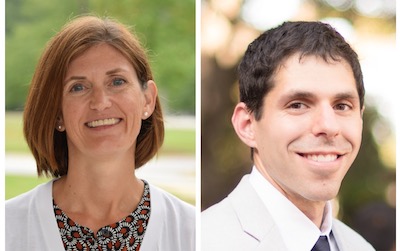The Frontiers in Congenital Disorders of Glycosylation Consortium (FCDGC), in close partnership with CDG CARE, has awarded 2021 pilot grants to Heather Flanagan-Steet, PhD, and Steven Sloan MD, PhD. The FCDGC/CDG-CARE Pilot Grant Program supports investigator-initiated studies that address translational research in CDG. Each researcher receives $50,000 in support for their work. Congratulations to them both!
Unraveling CDG complexity using systems approaches
Heather Flanagan-Steet is a developmental biologist. Her research interests are focused on understanding the molecular and cellular mechanisms driving the development of rare genetic disorders, particularly pediatric disorders like congenital disorders of glycosylation (CDG). She is the director of functional studies at Greenwood Genetic Center and associate research professor of biochemistry and genetics at Clemson University.
The overall goal of her project is to use a PMM2-CDG zebrafish model to identify and test novel therapies. She will evaluate the ability of the recently identified drug, epalrestat, to reduce PMM2-CDG pathogenesis (development of the disease) and explore the compound’s mechanism of action. She will also use RNA sequencing of PMM2-CDG embryos to find the specific pathways altered by PMM2 deficiency, mining this dataset for potential modifiers of disease severity.
The information gained will help identify new therapeutic candidates for patients with PMM2-CDG that may be applicable to other CDGs. The work will be performed at JC Self Research Institute at the Greenwood Genetic Center, whose mission is to provide comprehensive care to patients with genetic disorders.
Human neuron-glial impacts in the setting of PMM2-CDG
Steven Sloan is an assistant professor in the Department of Human Genetics at Emory University. His group is interested in the cellular events that coordinate human brain development and in understanding neuron-glial interactions in health and disease.
Sloan’s FCDGC project will use CDG patient-derived induced pluripotent stem cells (iPSCs) to ask how mutations in glycosylation enzymes affect developing human neurons and glia. This work will involve generating three-dimensional cortical organoids (synthesized tissues that contain several types of nerve cells and have anatomical features similar to regions of the cortex observed in brains).
These organoids will be used to perform cell type-specific glycomic and glycoproteomic profiling in the setting of PMM2 deficiency, which is the most prevalent CDG subtype. Finally, his group will test how existing FDA-approved drugs may ameliorate phenotypes in human cells. These studies will provide valuable pilot data towards building patient-specific 3D in vitro models of CDG, where a patient’s own tissues can be used to test potential treatments.
The Frontiers in Congenital Disorders of Glycosylation Consortium (FCDGC) is part of the Rare Diseases Clinical Research Network (RDCRN), which is funded by the National Institutes of Health (NIH) and led by the National Center for Advancing Translational Sciences (NCATS) through its Division of Rare Diseases Research Innovation (DRDRI). FCDGC is funded under grant number U54NS115198 as a collaboration between NCATS, the National Institute of Neurological Disorders and Stroke (NINDS), the Eunice Kennedy Shriver National Institute of Child Health and Human Development (NICHD), and the Office of Dietary Supplements (ODS).


